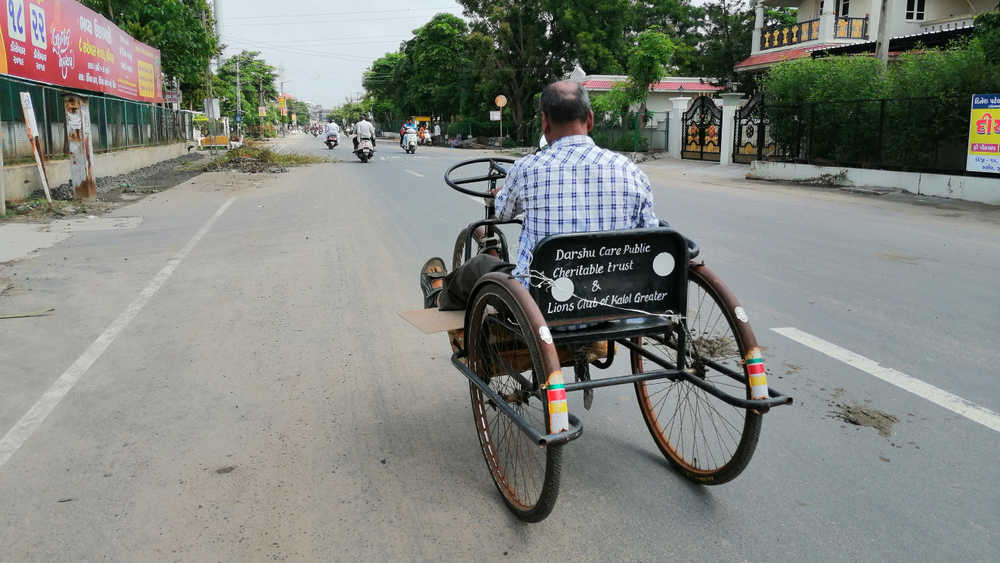The term ‘disability’ is defined as a form of mental or physical impairment that makes it difficult to efficiently perform one’s day-to-day activities. According to The World Health Organisation (WHO), disability centers around three key aspects:
• Impairment – Loss of sight, limb, or memory.
• Restricted Activity – Difficulty in seeing, listening, walking, or problem solving.
• Limited Participation – The restrictions in everyday activities because of the above factors including, working, involvement in social and recreational activities, acquiring healthcare and other essential services.
People with disabilities often face unacceptable discrimination and therefore, are often excluded from employment opportunities, skills training, healthcare services, education, and other major developmental areas.
India is home to approximately 1.36 billion people. According to the World Health Organization (WHO), the country’s 26.8 million disabled persons make up 2.2 percent of its total population. The National Health Portal of India states that the concentration of the disabled in rural areas at 2.24 percent, is higher than the urban areas where the disabled population is 2.17 percent.
Just like the rest of the population, the disabled persons are also privy to the fundamental and essential rights stated in the Indian Constitution. Irrespective of their background, origin, characteristic, and seriousness of disability this section of the population has the inherent right towards respect and human dignity and it is essentially important for this section of the population to be made aware of their equal access to the Fundamental Rights laid down by the Indian Constitution that ensures the right to enjoy a decent, dignified life for all.
The Constitution of India, universally applicable to every legal Indian citizen, guarantees the citizen the right for justice, liberty of thought, expression, belief, faith and worship, equality of status and of opportunity. However, it is imperative to underline the significance of the below-mentioned articles that emphasize the human rights of the disabled plethora of the nation:
• Article 15 (1): The Article states against the discrimination of any Indian citizen (including the disabled) – based on religion, race, caste, gender, or place of birth.
• Article 15 (2): The Article states that no citizen shall face any disability or liability restriction in terms of accessibility of efficient usage of essential services.
• There shall be equality of opportunity for all citizens when it comes to employment opportunities.
• Article 21: Each person has the security of his life and liberty under this article.
Additionally,
• Article 41 of the Directive Principles of State Policy (DPSP) – The Article states that the State shall make for effective provision for guaranteeing right to work, education, and public assistance for the disabled, unemployed, older, and sick persons.
• Right to Persons with Disabilities Act, 2016 – The Principles executed focus on the empowerment of Persons with Disabilities (PwD). These primarily included respect for the inherent dignity, individual independence – such as the freedom to make one’s choices. The Act focuses on disability from a human rights perspective.
The existence of these robust laws and special acts for the disabled persons notwithstanding, India’s disabled population is consistently facing enormous challenges and discrimination in various ways and is often much more disadvantaged than the general population. In an extremely deplorable situation in May this year, IndiGo Airlines, one of the country’s largest airlines, denied boarding to a disabled teenager who was going through a state of panic and anxiety. The airline staff shockingly issued a warning to the child and his parents that they would not be allowed to board the flight “”if the child did not quieten down and become ‘normal” and “that he was a risk to other passengers and would have to become ‘normal’, before he could be travel-worthy,” As an organisation that prides on being an inclusive and disabled friendly IndiGo Airlines majorly played a role in disability discrimination – by not just denying him boarding, but the fundamental denial of dignity and respect. This incident has yet again shed light on the discrimination and disadvantageous treatment towards the disabled population. This is just one of the various such discriminatory treatments incidents in the country – including the deboarding of a disability rights activist who was travelling to Goa to speak at an International Conference on Disability Issues.
The recent instances of discrimination highlight the ground reality in the country’s diaspora -of the lack of awareness of disability and challenges that face the disabled in the country. Although the mindset needs to be drastically transformed, the nation needs to be made to recognise that each and every disabled citizen has their right to the fundamental rights of the Constitution and not recognising the disabled section of the population will leave them entirely neglected – majorly marginalising them, not providing them with equal opportunities, essential services and consequently, leaving them out of decision making at the national level.
This could be drastically improve if the political decision makers at the national and local level including the rural areas, actively involve and engage with the disabled section of the population. Because with equal representation there will emerge, not just Government Acts for humanitarian treatment of the disabled but active participation of the two and a half million affected citizens of the country-to create awareness, infrastructure and self-dependence, ultimately resulting in a better and well equipped futuristic society.
Image – Shutterstock

